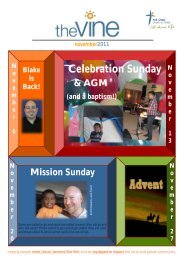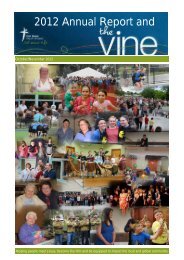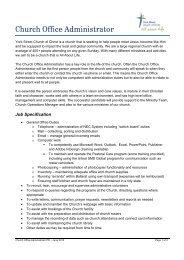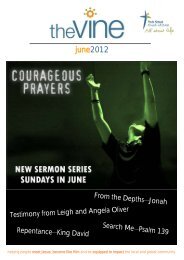The Vine February 2013 - York St Church of Christ
The Vine February 2013 - York St Church of Christ
The Vine February 2013 - York St Church of Christ
You also want an ePaper? Increase the reach of your titles
YUMPU automatically turns print PDFs into web optimized ePapers that Google loves.
we are under. We can say things like, “I don’t<br />
know how to handle this situation”, “I feel really<br />
disappointed that I couldn’t help you learn that<br />
previously and I’m taking that out on you”, “I feel<br />
stressed about life in general at the moment and<br />
don’t have the energy to be as kind as I want”, “I<br />
am worried that other people will think badly <strong>of</strong><br />
you” or “I let you do that because I was tired but I<br />
probably shouldn’t have for your sake long term”.<br />
Sharing our struggles helps young people know<br />
what is going on, and helps them understand our<br />
reactions are not just about them. HOWEVER, and<br />
this is an extremely important point – we must be<br />
careful that we “own” our own struggles with caring<br />
for young people. This is<br />
about our journey and we<br />
need to make that clear. So<br />
when we share what we are<br />
worried/stressed/frustrated<br />
about we should make<br />
sure it is sharing rather than<br />
blaming or lecturing. Our<br />
sharing should not send the<br />
message “see how much<br />
stress you put me under”<br />
or “so therefore you should jolly well be more<br />
considerate”.<br />
3. Once the mistakes have been made, it’s vital<br />
to step back and look at what went wrong and<br />
why. This is so that we can prepare in advance<br />
for difficult times. We all know that there are times<br />
which are going to be harder than others when<br />
interacting with young people. Frankly, I do pretty<br />
pathetic parenting before 7am. When things do<br />
go wrong, it helps us identify times we know are<br />
likely to continue to be difficult. We should be<br />
mentally putting flags on these times – whether it<br />
be last lesson on a certain day, preparing for tea,<br />
late at night, or whenever our willpower and energy<br />
are at their lowest. Once we have identified<br />
those times, we need to be honest about the fact<br />
however good our intentions are. We are likely to<br />
get impatient, give in or do other kind <strong>of</strong> ineffective<br />
“Teaching/parenting/caring<br />
well is a marathon not a sprint.<br />
Mistakes are part <strong>of</strong> the process,<br />
and help us care more effectively<br />
for young people than if we<br />
hadn’t made the mistake in the<br />
first place.”<br />
caring at those times. <strong>The</strong>refore, we should<br />
consider whether we can change things around so<br />
we are not setting ourselves up for failure at those<br />
times. We could set up guidelines that we simply<br />
don’t do certain things at that time, for example,<br />
we might say we don’t have conversations or<br />
make decisions at that time <strong>of</strong> day, we might<br />
not deal with behaviour problems until the next<br />
morning, we might have a rule that we eat before<br />
we talk, do low intensity teaching/caring at certain<br />
lessons – or something similar. Of course we need<br />
to make sure we organise alternative times when<br />
we are fresher to do these things rather than just<br />
avoiding them entirely. It is not always possible to<br />
avoid interactions entirely.<br />
but sometimes a bit <strong>of</strong><br />
preplanning/having rules<br />
<strong>of</strong> thumb/policies about<br />
certain times can help.<br />
4. Finally, next time we<br />
should be reminding<br />
ourselves to breathe.<br />
When we know we are<br />
stressed, frustrated or<br />
worried and simply have<br />
to deal with young people – one quick and easy<br />
thing to do is: Breathe deeply before we speak.<br />
<strong>The</strong> positives in taking a deep breath are more than<br />
an old wive’s tale. When we breathe deeply, we<br />
make physical changes in our brain. We redirect<br />
brain activity away from the “fight/attack/defend”<br />
centres and toward to “careful thought” centres.<br />
This then helps us react more thoughtfully – and in<br />
line with our intentions.<br />
We will all ineffectively deal with young people at<br />
times. Teaching/parenting/caring well is a marathon<br />
not a sprint. Mistakes are part <strong>of</strong> the process, and<br />
help us care more effectively for young people than<br />
if we hadn’t made the mistake in the first place.<br />
Kirrilie Smout<br />
Used by permission <strong>of</strong> Kirrilie Smout.<br />
All rights reserved.<br />
27.










